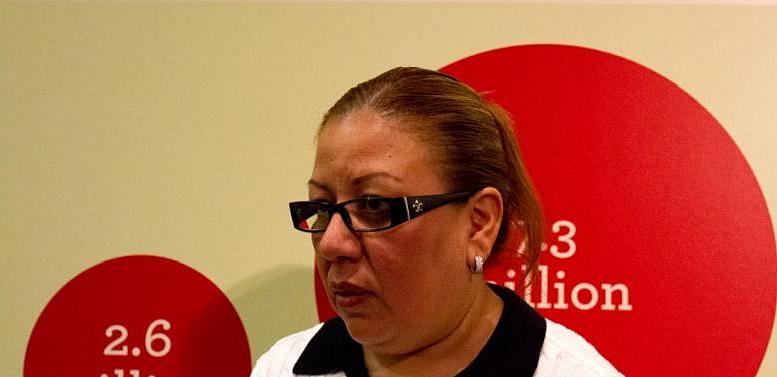Complaint seeks better Medi-Cal access for patients and physicians
Gerardo Fernández wrote this article for Alianza Metropolitan News through the USC Center for Health Journalism's California Fellowship.
Other stories in the series include:

Gerardo Fernández, Alianza News Saúl, 32, started having seizures about 17 years ago. That’s when his mother, Ana Lilia Jiménez Perea, started taking him to specialists near his home near Santa Rosa, Calif., as a Medi-Cal beneficiary. Three years ago, when Medi-Cal rolls began increasing as a precursor to the 2014 expansion under the Affordable Care Act, Saul’s access to specialists began to dry up. Jiménez said no Medi-Cal physician would see her son, and he was put on a waiting list that lasted close to two years.
Saúl, 32, started having seizures about 17 years ago. That’s when his mother, Ana Lilia Jiménez Perea, started taking him to specialists near his home near Santa Rosa, Calif., as a Medi-Cal beneficiary.
Three years ago, when Medi-Cal rolls began increasing as a precursor to the 2014 expansion under the Affordable Care Act, Saul’s access to specialists began to dry up. Jiménez said no Medi-Cal physician would see her son, and he was put on a waiting list that lasted close to two years.
Saul’s Medi-Cal coverage was assigned to Partnership HealthPlan of California, a non-profit community- based health care organization that administers Medi-Cal benefits in 14 counties in Northern California, including Marin County where the Jimenez family lives.
When the family asked why access to the specialists was becoming more difficult, “they said because Medi-Cal does not pay them enough and not on time,” Jiménez said.
“Saúl has to see a neurologist every six months, but it took almost two years to find one who would accept Medi-Cal,” said Jiménez. “Now we only see the doctor every 12 to 18 months.”
Saúl had to wait 18 months to see a gastroenterologist and a pathologist. “But they told us he could see a nurse that worked with the doctor at the community clinic in Ukiah,” which is about an hour north from where they live, added Jiménez.
They also had to stop seeing an ophthalmologist, who needs to monitor Saul for glaucoma every six months.
Medi-Cal restricted his drug coverage to a generic medicine, which Jiménez said did not control his seizures. So she started paying out of pocket.
Cases like this caught the attention of several organizations, which filed a complaint with the Office of Civil Rights at the U.S. Department of Health and Human Services alleging that Medi-Cal’s 13 million beneficiaries do not have adequate health care. Seven million of them are Latinos.
“Our union members helped close to 20,000 people get enrolled into Obamacare, and many got enrolled into Medi-Cal. We started noticing that they were not getting the medical attention they needed,” said Hortencia Armendariz, Director of Healthcare Outreach at SEIU-United Healthcare Workers.
The union joined with MALDEF (Mexican American Legal Defense and Educational Fund), the National Health Law Program, the Civil Rights Education and Enforcement Center (CREEC), Physicians for a National Health Program, among other groups to file the complaint.
The state Department of Health Care Services, which administers Medi-Cal, said it has not found evidence of access issues. “We continually monitor access to ensure members can receive care,” said DHCS spokeswoman Carol Sloan via an email.
Medi-Cal services are provided through both managed care plans and through fee-for-service (FFS); close to 80 percent of Medi-Cal members are on the former. Sloan said that on the managed care side, DHCS “has a robust process for monitoring access to health care services that includes a quarterly network adequacy assessment and an annual timely access audit.”
According to Sloan, “Managed care contracts define provider-to-member ratios at 1:2,000 for primary care physicians and 1:1,200 for total physicians.”
Many other health organizations that are not part of the complaint agree that there is a problem regarding Medi-Cal reimbursement for physicians.
The California Medical Association (CMA), which represents physicians, contends that a typical office visit is reimbursed at roughly $16, one of the lowest levels in the nation.
“It is imperative that we bring Medi-Cal payments to a rate to help ensure health care access for California's children, seniors and most vulnerable patients,” said Griffin Rogers, Communications Coordinator with CMA.
Health Access California, a healthcare consumer advocacy coalition, said it is also concerned about the effect of Medi-Cal reimbursements on access to care.
Tam Ma, Policy Counsel at HAC, said that the coalition will participate in a state advisory committee that will assess problems of access and make recommendations for improvements.
The federal government required the state to put together the committee when it granted a five year waiver of Medicaid rules so California could advance several initiatives.
The waiver “provides an important opportunity for California to leverage [federal funds] to improve access for low-income Californians,” according to a blog post by Christopher Perrone, the director of the California Health Care Foundation’s Improving Access team.
[This story was originally published by Alianza News.]

